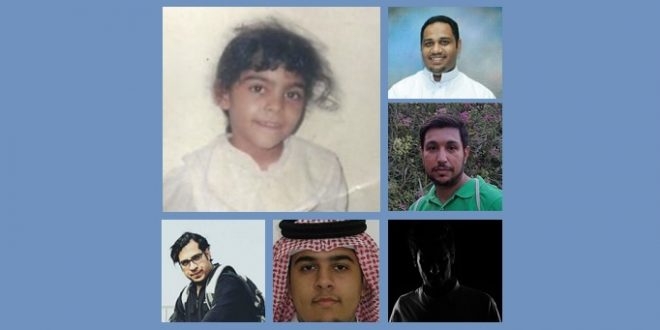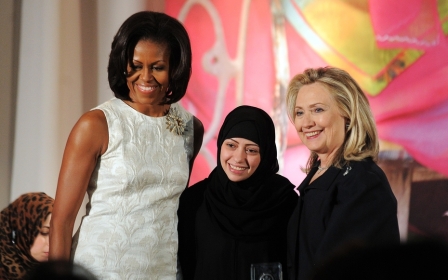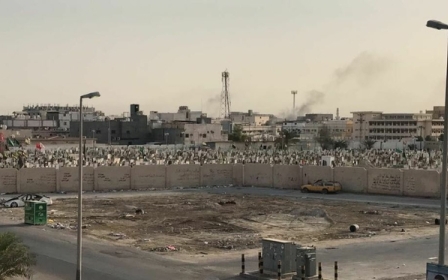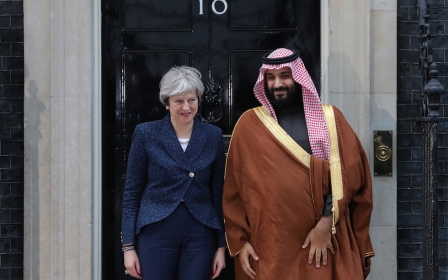Saudi Arabia sentences female human rights defender to death

Saudi human rights activists have warned against the possible beheading of detained female human rights activist Israa al-Ghomgham, who has been provisionally sentenced to death by a Riyadh court.
On 6 August, in a first hearing before the Specialised Criminal Court in the capital, the public prosecutor recommended the death penalty for six defendants, including Ghomgham and her husband, Moussa al-Hashem, who have been jailed for nearly three years on charges of anti-government protests, incitement to disobedience of the ruler, and providing moral support to participants in anti-government protests in the Shia-majority eastern region of Qatif.
Ghomgham, 29, and Hashem were arrested on 8 December 2015 in a house raid by Saudi security forces. She was one of the leaders of anti-government protests that have erupted in Qatif since 2011, demanding an end to anti-Shia discrimination and the release of political prisoners.
According to Saudi human rights groups, Ghomgham, who belongs to a low-income family, could not afford a lawyer throughout her 32 months in detention. After her case became known, however, many lawyers offered their services to her family pro bono.
The final session for Ghomgham's case is scheduled for 28 October. A judge will either confirm or reverse the death penalty recommendation issued by the public prosecutor in August.
Beheadings usually take place in Saudi Arabia after the decision is ratified by the king - in this case, King Salman bin Abdulaziz.
“Sentencing a female human rights defender to death is a dangerous precedent in Saudi Arabia,” said Ali Adubisi, director of the European Saudi Organisation for Human Rights (ESOHR).
Adubisi said all the charges against Ghomgham were related to her activism, adding that none of the charges levied against her involved use of violence that would warrant the death penalty under Saudi law.
“It’s largely a revenge against the Arab Spring, and a punishment for Qatif, which witnessed the largest protests since 2011,” Adubisi told MEE.
According to the latest tally by ESOHR, at least 58 people, most of them Shia, are currently on death row in Saudi Arabia, 31 of whom had their verdicts confirmed by the High Court.
The preliminary death penalty verdict against Ghomgham has prompted a campaign for her release on social media, with many warning this could be the first time Saudi Arabia executes a female political activist.
A video from 2015 showing the beheading of a Saudi woman spread on social media erroneously identifying the woman in question as Ghomgham, while a photo of Samar Badawi, another imprisoned Saudi activist, was wrongly circulated as being Ghomgham.
However, relatives and activists have refuted reports that Ghomgham had been executed, adding there were no readily available photographs because she wears the niqab, or face veil.
A UN report released in June stated that the Gulf kingdom was systematically using its counterterrorism laws to suppress human rights defenders.
“Those who peacefully exercise their right to freedom of expression are systematically persecuted in Saudi Arabia,” the report said. “Many languish in prison for years. Others have been executed after blatant miscarriages of justice.”
Saudi Arabia remains “one of the most prolific executioners in the world”, beheading at least 100 people in 2017 alone, according to Amnesty International.
New MEE newsletter: Jerusalem Dispatch
Sign up to get the latest insights and analysis on Israel-Palestine, alongside Turkey Unpacked and other MEE newsletters
Middle East Eye delivers independent and unrivalled coverage and analysis of the Middle East, North Africa and beyond. To learn more about republishing this content and the associated fees, please fill out this form. More about MEE can be found here.




